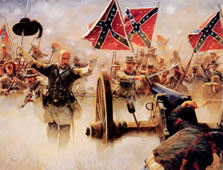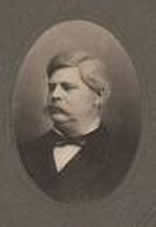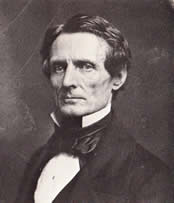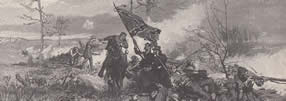North Carolina War Between the States Sesquicentennial
Toward an Accurate History of the War
"The history of mankind is the history of its great men; to find out these, clean the dirt from them,
and place them on their proper pedestal, is the true function of the historian."
Carlyle

“The real story of any great event is apt to be very different to what appears at the time.
That is especially the case in war. The fate of millions of people turns on decisions that are
taken by one man – who may be influenced by the most curious of motives in reaching a decision
that changes the whole course of history. The way he makes up his mind is known only by
a few men who behind the scenes, who usually have good reason for keeping it quiet.
The truth sometimes leaks out later; sometimes never.” B.H. Liddell Hart
“To deliver examples to posterity, and to regulate the opinion of future times, is no slight or trivial undertaking;
nor is it easy to commit more atrocious treason against the great republic of humanity, than by falsifying
its records and misguiding its decrees.”
Samuel Johnson, Rambler No. 136
“I don’t know when the last time you picked up a textbook in American history might have been.
And there are, to be sure, some very good ones still in print. But most of them, it appears to me,
have been published in order to kill any interest that anyone might have in history. The textbooks
are dreary, they’re done by committee, they’re often hilariously politically correct and they’re not doing any good.”
David McCullough
“Each generation writes its own history, which means that historical questions differ depending on the
time in which people raise them. It also suggests that historians are subject to the blinders and prejudices
of the period in which they live.”
Ella Lonn
“The national government stopped paying any attention to the Constitution with the election
of Abraham Lincoln. That's what the War Between the States was really all about. The South wanted
the constitutional republic, which strictly limited the powers of the federal government. The North
wanted a centralized national government, which would itself define the limits of its powers –
or, to put it another way, would have unlimited powers. That was an old argument that had
begun at the Constitutional Convention, and it ended at Appomattox.”
Charley Reese
“One learns very early in academic historical training that a sure road to success lies in finding a new
twist on South-hating, supported by quotations selected out of context and references to current fashionable
abstractions that pass for reasoning, such as that the South was not only evil but weak and stupid, its
War for Independence having been waged ineffectively, inadequately, and incompetently.
I can cite several cases where books along these lines have catapulted their authors into professional
celebrity and endowed chairs. Writing history is easy if you only need theory and not evidence.”
Clyde Wilson, 1998

Governor Zebulon Vance
“The preservation of the truth – especially the truth of history – challenges the interest of
all mankind. To set forth the real deeds which we and our associates enacted, and the real
issues before us as the only proper motives which incited to their performance, is a solemn
duty we owe to ourselves and to posterity – to those who are to succeed us as citizens of
the United States under a peculiar and most complicated system of government.
The light which our conflict will afford them with many difficulties of the future, will be as a lamp
unto their feet, if our story be truly told; but if falsely related, it would prove a delusion and a snare.
False history must teach false lessons. And false indeed would have been the verdict of the muse
had it been inspired alone by the bitter rantings of and partisan war cries of one side; and that
side, too, making history, or trying to make history, for the purpose of keeping itself in power.”
Zebulon Vance, Address before the Southern Historical Society, 18 August, 1875
“A good historian ought to make it clear where he is coming from rather than assume an impossible
Olympian objectivity. Then, if he has handled his evidence honestly, he has fulfilled the demands of his craft –
whether or not we agree with the interpretation he has placed upon his evidence. Ideally, interpretation
should come separately from, and after, presentation of that evidence.
Two historians, for instance, may agree that the New Deal was not really very radical a program. One of these
may be pleased by this conclusion and the other regret it; both, however, in their honest description have
done their job as historians.
Their opinion about their finding, of course, is another question. (And as Sir Herbert Butterfield wisely
warned long ago, historian’s opinions can too easily become self-centered moral judgments,
even preferences of taste masquerading as moral judgments.)”
(Clyde Wilson, November 1999)

Jefferson Davis
The North Uncovers Diabolical Southern Plot:
“In the late nineteenth century, before pioneering Southern historians exerted great influence, a pro-Northern
explanation of the coming of the war had gained rather general acceptance, thus seemingly confirming
Jefferson Davis’s fears that this might become the South’s greatest war loss.
Historians at the same time had also moved away from the emotion-packed interpretations of the coming
of the war earlier set forth by Northern writers such as Henry Wilson, John A. Logan, and Herman von Holst.
According to them, there had been wickedness only South of Mason and Dixon’s line. Southern leaders had
been guilty of a diabolical plot to destroy a sacred union which they could no longer selfishly control, for
the purpose of perpetuating and extending the hideous institution of slavery.
Against an aggressive Southern “slavocracy,” a nobly motivated Northern people had defended national
morality, democracy, and liberty. To the South was assigned a villain’s role in the successive events
of the 1846-61 era. The annexation of Texas was a dark Southern conspiracy. The Mexican War was a
war of aggression to seize away from a weak neighbor some or all of its territory for expansion of
slavery and continued Southern control of the federal government.
In such unholy activities the South prostituted the Democratic party in its purposes and received
support from such sycophantic Presidents as Franklin Pierce and James Buchanan. Southern slaveowners
were evil men lacking even the rudiments of Christian morality, while Northern abolitionists and the
Republican party were as pure as the driven snow.”
(Cauthen, The Coming of the Civil War, pp. 226-227)
The Source of All Sins and Sophistries in History:
“Most historians since 1930…have not been concerned with proving whether the war was inevitable or not.
Even some of the revisionists underwent a metamorphosis and placed less emphasis on the question.
Allan Nevins, one of the most prolific of American historians….stressed the basic race question as
crucial to a complete cultural schism….[and was seen by James Ford Rhodes as] obsessed sometimes
not with the importance of slavery but with its morality. As [historian] Fletcher Green has put it,
“Like the abolitionists of the period of which he writes, Nevins seems to be blinded by his sense of moral values.”
With the publication of Anti-Slavery Origins of the Civil War in 1939, [Dwight D.] Dumond gave evidence
of being a neo-abolitionist. By 1961, Dumond was writing about “America’s present responsibility in
human relationships,” and, on a Christian basis, emotionally condemning inequalities. In so doing,
he included polemics against slaveholders and almost beatified abolitionists.
Russell B. Nye revived the idea of a conspiracy by the “slavocracy” in 1946 and gave it a new twist.
He suggested that the slave power aimed at suppressing civil liberty in both North and South, thereby
making its “defense of slavery” really a counterattack against free institutions.
David M. Potter, in his….Lincoln and His Party in the Secession Crisis…[argued] that Lincoln was in
complete control of his party and was trying sincerely to save the Union short of war. As Potter later said,
Lincoln did not want war but merely accepted what seemed inevitable, hoping that the Confederates
would shoot first if there had to be a war.
Several problems have plagued these ambitious scholars who have sought to understand the background
and causes of the great American tragedy. One is the ever-present temptation of “presentitis.”
Consciously or not, historians are conditioned in their thinking to
by their own times and circumstances.
As Herbert Butterfield has remarked, “the study of the past with one eye on the present” is indeed
“the source of all sins and sophistries in history.” The judgment of modern historians too often reflects
their attitudes on these thorny issues. In some instances, one can predict rather accurately certain
historians’ reactions to certain books – if one knows the thesis of the book and the point of view of
a contemporary-minded historian.
As early as 1934, Theodore C. Smith was already worried lest the goal of writing objective history
might already have begun to be eroded by the assumption of contemporary political and social values
should affect historical writing. Smith warned that history was already
being used this way by European dictatorships.
(Cauthen, The Coming of the Civil War, 1967, pp 241-247)

Since the end of the war, the Southern historian’s view of the conflict was not considered
objective unless “he accepts and proclaims the Northern (i.e., “national”) interpretation of Southern things.”
Historical Objectivity and Machines
“Once, years ago, a Southern historian beckoned me aside and led me to a room . . . “Look,” he said.
An enormous machine occupied about half the room, and a graduate assistant was feeding punch
cards into it. With inhuman noise and precision, the machine was sorting the cards.
The historian closed the door upon the noise and, with a kind of Stonewall Jackson glint in his eye,
explained. Documentation, he said – mere documentation – would never convince the North.
Mere argument was futile.
But if he could say, in a footnote to his forthcoming publication, that the figures in his statistical
tables had been achieved by the assistance of a card-sorting machine (he would carefully cite the
machine’s name and model), then the Yankees might hearken to both his documentation and
his argument. The machine, a guarantee of his “objectivity,” would remove his work from the area of
suspicion that a study originating in the South would normally occupy.”
(Still Rebels, Still Yankees, Donald Davidson, pp. 180-181)

Conservative historian M.E. Bradford was deeply concerned by the ongoing deification and
cult status of Lincoln, and how Yankee idolatry of him had so blurred the history, nature and
consequences of the war “as to render Lincoln impervious to serious criticism.”
Lincoln’s War to Prevent Self-Government
“As Frank Owlsey complained in 1946, there was afoot in this land, “what seems to me a
Lincoln cult bordering on pagan deification which is taking place in the popular mind of the
North”; and it has been seriously inspired by serious scholars, who have allowed their
emotions and bias to overemphasize certain elements and minimize others.”
In his essay on “A Southerner’s View of Abraham Lincoln,” Owsley’s principal complaint
was not that Lincoln lacked moral scruples, but that he frequently exercised poor judgment –
as seen, for example, in his refusal to accept the Crittenden Compromise and in his naïve,
persistent belief that the people of the South would never support their leaders in a war of secession.
Lincoln, argued Owsley, never fully grasped the depth of Southern patriotism or the magnitude
of the war, until it was too late to compromise. By denying the South the right to self-government,
Lincoln also subverted the democratic principles of the document he so often cited as authority
for his constitutional views – the Declaration of Independence. “It seems ironic to Southerners
that the United States,” observed Owsley, “a nation based upon the right of the people to live
under a government of their choice, should make war to prevent a people – the South –
from living under a government of their choice.”
No less charitable with respect to Lincoln’s motives and moral reasoning, Donald Davidson
also questioned Lincoln’s political acumen . . . asserting that the emancipator foolishly made war
on his own ideas and objectives, ruining both the South and the North
while creating an America he did not want.
[M.E.] Bradford persuasively demonstrated [that Lincoln] was more than simply wrong-headed;
he was “dishonest” and “duplicitous” “pseudo-Puritan,” a disingenuous “opportunist” guilty of
“calculated posturing,” “historical distortions,” and “high crime”; he was indeed “the American Caesar
of his age.” “It is at our peril,” Bradford cautioned, “that we continue to reverence his name.”
(Walking the Levee with Mel Bradford, James McClellan;
A Defender of Southern Conservatism, M.E. Bradford and His Achievements, Clyde N. Wilson, editor,
University of Missouri Press, 1999, pp. 45-46)

Sources and Bibliography
C.E. Cauthen, The Coming of the Civil War, Writing Southern History, Link & Patrick, editors, LSU Press, 1967
Still Rebels, Still Yankees, and Other Essays. Donald Davidson, LSU Press, 1957
Rembering Who We Are, Observations of a Southern Conservative, M.E. Bradford, UGA Press, 1985
Southerners and Other Americans, Grady McWhiney, Basic Books, 1973
Ideas Have Consequences, Richard M. Weaver, University of Chicago Press, 1948
Where No Flag Flies, Mark R. Winchell, University of Missouri Press, 2000
In Defense of Tradition, Richard M. Weaver, Liberty Fund, 2000
Frank L. Owsley, Historian of the Old South, Harriet C. Owsley, Vanderbilt Press, 1990
Destroying the Republic: Jabez Curry and the Re-Education of the Old South, Algora, 2005
Walking the Levee with Mel Bradford, James McClellan; University of Missouri Press, 1999
Copyright 2012, the North Carolina War Between the States Sesquicentennial Commission